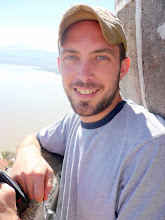
Nobel, Pacem in Terris winner talks about peace efforts
By Dan Ebener
Dan Ebener, stewardship director for the Diocese of Davenport, and a professor at St. Ambrose University, poses for a photo with from left, his son, Josh, 1980 Nobel Peace Prize winner Adolfo Perez Esquivel, and Ebener’s son, Zach.
BUENOS AIRES — Sometimes the world seems like a very small place. While visiting my son, Josh, in Buenos Aires, I also was able to visit with and interview Adolfo Perez Esquivel, the 1980 Nobel Peace Prize winner who also received the Pacem in Terris award in 1999.
The following story illustrates the relationship between Adolfo and two other Nobel Peace Prize winners who also are Pacem in Terris recipients, Bishop Desmond Tutu (1987) and Mairead Corrigan Maguire (1990).
In 1978, Adolfo Perez Esquivel was the coordinator of Service for Peace and Justice (SERPAJ), based in Buenos Aires, and I was a local organizer for the Fellowship of Reconciliation (FOR), based in Dubuque. I first heard of Adolfo because his organization was affiliated with the International FOR (IFOR). Because of his work on human rights, Adolfo became one of Argentina’s “disappeared.” When he disappeared, many of us wrote letters to government officials calling for his release. In the late 1970s, many of the disappeared in Argentina were never seen or heard from again. We were worried about Adolfo. Jim Forest, who was coordinating the IFOR at the time, suggested to Mairead Corrigan Maguire, the IFOR contact person in Ireland, that she nominate Adolfo for the Nobel Peace Prize to create additional pressure on the Argentine government to release Adolfo.
When Adolfo was awarded the Nobel Peace Prize in 1980, it was a surprise to everyone. No one in the international media seemed to know who he was. At that time, I was working for the FOR national offices in New York, and we became the point of contact for his media work. Over the next few years, I met Adolfo several times and organized one of his speaking tours to the USA.
What follows is an abbreviated text of my conversation with Adolfo on March 10.
Dan: Tell us about your experiences of the late 1970s.
Adolfo: In 1978, I was in prison. I learned from my family that two Irish women had nominated me for the Nobel Peace Prize. Two days before the World Cup, they transferred me to house arrest. This was in response to the international pressure of the nomination. Shortly thereafter, Mairead Corrigan came to Argentina and visited me at home. During her visit she was being followed and intimidated. Joan Baez (a folk singer) also came to visit and she received threats and was not able to play her music.
Dan: Why did Mairead nominate you for the Nobel Peace Prize?
Adolfo: She knew of our work in Latin America, in 15 countries. There was not only a dictatorship in Argentina but rather there were dictators throughout the continent. Our work on nonviolence is ecumenical. She nominated me while I was in prison.
Dan: Could you talk about the power of international contacts?
Adolfo: I am a survivor thanks to international solidarity. Networks are effective. A dictatorship can censure domestically but not internationally. I felt this strongly when I was taken out of prison in chains. I was taken up in an airplane over the River Plate. This was called “vuelo de la muerte,” the flight of death, as they would drop people out of the planes. I was up there for hours. I could see Montevideo. But they got a counter-order because of international pressure and I was not dropped out of the plane. So this pressure is very effective. There was also resistance within the country and from other countries. It was an international network of solidarity.
Dan: Tell us more about your relationship with Mairead.
Adolfo: I went to Ireland to support her when they were in the midst of war. Our struggle is one. I also went with her to Iraq. We try to join forces. She is a beloved sister. She supports the needs of the people. We went to Baghdad and saw the horror and the death of children. I was with Desmond Tutu in Thailand and with the Dalai Lama. We were advocating for the release of Aung San Suu Kyi.
Dan: Could you tell us about the causes that you are fighting for today in Argentina?
Adolfo: We are working on three main fronts (these are the priorities of SERPAJ):
• Lands that have been taken from the indigenous people and farmers. These lands are being sold to transnational companies. I am preparing a seven-page letter to send to the Argentine president. Our forests are being destroyed. This is leading to hunger and death; 22 indigenous people died in the north of hunger. Argentina is being turned into a mono-crop country (soy) plagued by the over use of agrichemicals.
• Mining companies. Unfortunately, a lot of gold has been found in Argentina. These are open mines. Two harmful products are used: mercury and cyanide. This goes into our soil and water. I went to Canada to meet with the minister of the exterior. Canada has mining companies with operations in Argentina.
• Children living in poverty. Our organization, SERPAJ, is teaching young people concrete skills. We have classes in barrios. We are focusing on potable water, community gardens and preventive health.
Dan: Would you tell us about the power of nonviolence?
Adolfo: If violence is met with violence we just have more violence. But when resistance is spiritual, social, cultural, and political, then that resistance is not isolated but massive. We offered this resistance in hope. Almost all our struggles throughout Latin American are nonviolent and continue to persist.






